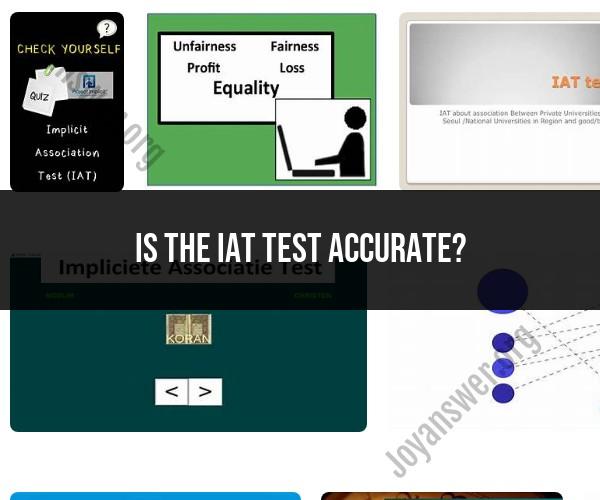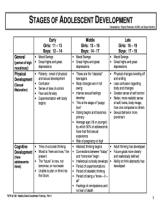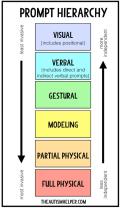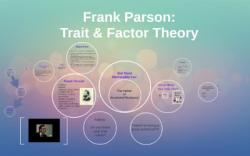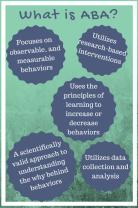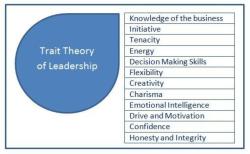Is the IAT test accurate?
The Implicit Association Test (IAT) is a psychological tool designed to measure implicit biases and attitudes that individuals may hold unconsciously. While the IAT has been widely used in research and has generated significant interest, its accuracy and reliability have been subjects of debate and scrutiny. Here are some key points to consider when assessing the accuracy of the IAT:
Measuring Implicit Biases: The IAT is primarily used to measure implicit biases, which are unconscious biases that individuals may hold based on factors such as race, gender, or other social categories. It's important to understand that implicit biases are distinct from explicit, conscious beliefs and attitudes.
Moderate Reliability: Research suggests that the IAT has moderate test-retest reliability, meaning that an individual's scores on the test can vary if taken on different occasions. This has raised concerns about the consistency of IAT results.
Cultural and Contextual Influences: The IAT's accuracy can be influenced by cultural and contextual factors. It may not provide consistent results across different cultural or social contexts, and its validity can be affected by the specific wording and framing of the test.
Predictive Validity: The IAT's ability to predict real-world behavior has been questioned. While some studies have found correlations between IAT scores and certain behaviors, the strength of these correlations can vary, and the test may not reliably predict behavior in all cases.
Critiques and Controversies: The IAT has faced criticism from some psychologists and researchers who argue that it lacks transparency, has methodological limitations, and may not provide a complete or accurate picture of implicit biases.
Self-Report Measures: Some experts argue that self-report measures and explicit questioning can be more accurate and reliable in assessing attitudes and biases because they directly capture individuals' conscious beliefs and attitudes.
Ongoing Research: The accuracy and utility of the IAT continue to be subjects of ongoing research and debate within the field of psychology. Researchers are exploring ways to improve the test's reliability and validity.
Ethical Considerations: The use of the IAT, particularly in employment or legal settings, raises ethical questions related to privacy, fairness, and potential unintended consequences.
In summary, the accuracy of the IAT is a topic of ongoing discussion and research within the field of psychology. While it has been valuable for raising awareness about implicit biases, its limitations and reliability have led some researchers to question its utility as a predictive tool for individual behavior. When interpreting IAT results, it's important to consider the context, recognize its limitations, and use caution in making sweeping judgments about individuals based solely on their test scores.
The Accuracy of the IAT Test: Evaluating Its Precision
The Implicit Association Test (IAT) is a psychological test that measures unconscious biases. It is based on the idea that our associations between different concepts can influence our behavior, even if we are not aware of it.
The IAT works by measuring the time it takes participants to categorize different words and images. For example, participants might be asked to categorize black and white faces as either good or bad, or to categorize words associated with men and women as either strong or weak.
The IAT is based on the assumption that people with unconscious biases will be faster at categorizing items that are consistent with their biases. For example, someone with an unconscious bias against black people might be faster at categorizing black faces as bad than white faces as bad.
The IAT has been shown to be a reliable measure of unconscious bias. However, it is important to note that the IAT is not a perfect measure. It can be influenced by a number of factors, such as fatigue, anxiety, and motivation.
The IAT Test and Accuracy in Psychological Assessments
The IAT has been used in a number of psychological assessments, such as job interviews, college admissions, and criminal justice screenings. However, there is some debate about the accuracy of the IAT in these contexts.
Some critics argue that the IAT is not a valid measure of unconscious bias in real-world settings. They argue that the IAT is too artificial and that it does not reflect how people actually behave in the real world.
Others argue that the IAT can be a useful tool for identifying unconscious biases, but that it should not be used as the sole basis for making decisions about people's lives.
Gauging Test Accuracy: Can the IAT Be Relied Upon?
The IAT is a relatively new test, and there is still some debate about its accuracy. However, there is some evidence to suggest that the IAT can be a reliable measure of unconscious bias.
For example, a study by Greenwald et al. (2003) found that the IAT was able to predict racial discrimination in hiring decisions.
Another study by Nosek et al. (2007) found that the IAT was able to predict racial bias in evaluations of job applicants.
These studies suggest that the IAT can be a useful tool for identifying unconscious biases in real-world settings. However, it is important to note that the IAT is not a perfect measure. It should be used in conjunction with other measures of bias and should not be used as the sole basis for making decisions about people's lives.
Overall, the IAT is a promising tool for measuring unconscious bias. However, more research is needed to validate its use in psychological assessments.
